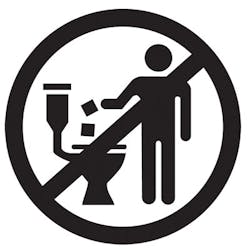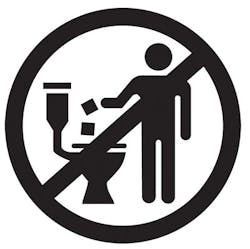District of Columbia Disposable Wipes Law Survives Challenge
By Patrick Crow
The nation’s first enacted law designed to prevent disposable wipes from clogging sewer systems has endured a preliminary skirmish.
The Council of the District of Columbia passed an ordinance late last year to ensure that “flushable” wipes really do degrade in sewers in a “low period of time.” It required that non-flushable wipes be more clearly labeled as such. The regulation will take effect Jan. 1, 2018.
Congressman Andy Harris (R-Md.) took objection. Congress oversees D.C. government spending and he sought to amend the D.C. appropriations bill to forestall the rule. Echoing the views of disposable wipe manufacturers, Rep. Harris said the D.C. law simply amounted to a ban on flushable wipes.
D.C. officials disagreed. They saw their ordinance as a “truth in advertising” directive that would ensure that flushable wipes actually were.
Water groups focused on the bigger picture: if Congress blocked the D.C. initiative, other states and cities might be deterred from regulating non-disposable wipes.
Members of the Water Environment Federation (WEF) sent 226 missives via its Water Advocates grassroots advocacy portal supporting the D.C. rule. The National Association of Clean Water Agencies (NACWA) urged its members to contact their senators to support the rule should challenges arise in that chamber.
In the end, Rep. Harris relented. He withdrew his amendment but asked the Appropriations Committee staff to work with the D.C. government to ensure that mutually acceptable standards are drafted.
Wipes manufacturers and water associations fully agree on the need for accurate labeling of disposable wipes but not necessarily on how to ensure those standards are achieved.
INDA, formally known as the International Nonwovens and Disposables Association, updated its code of practice for its members last March. The standards - drafted with the cooperation of WEF, NACWA, the American Public Works Association and the Canadian Water & Wastewater Association - called for stricter and more visible labels on non-flushable wipes and hygiene products. Manufacturers were asked to comply with the voluntary standards within 18 months.
Voluntary standards are well and good, but wipes manufacturers worry about an eventual hodgepodge of state and city regulations. Several states already have attempted to pass discrete flushable wipes laws.
INDA maintains that public awareness and education, not legislation, is the most effective approach to alleviate non-flushable wipes problems for sewer systems.
The manufacturers note that flushable and non-flushable wipes are engineered for different uses and are intended different fates. Flushable wipes are 100 percent plant-based cellulose products that biodegrade in water. Other wipes, made with plastic fibers, should be tossed in the trash.
They say flushable wipes are far from the biggest culprit in clogging sewage systems. Paper towels are - accounting for nearly 50 percent of that kind of debris in wastewater system filter screens. Next are baby wipes, feminine hygiene products and then household and personal care wipes. Flushable wipes are responsible for 8 percent.
Long term, the District of Columbia rulemaking could be the least of the manufacturers’ woes.
Jack B. Weinstein, senior judge of the U.S. Eastern New York District Court, recently certified two class-action lawsuits against makers of flushable wipes. In those suits, plaintiffs alleged that “flushable” products made by Kimberly-Clark and Procter & Gamble had damaged their plumbing systems because they had not dissolved as advertised.
Justice Weinstein candidly admitted that his decision was on the “knife edge” of the law, that the manufacturers surely would appeal, and that there was a good chance the Second Circuit Court of Appeals might reverse. Even so, more class-action lawsuits loom in other jurisdictions.
About the Author: Patrick Crow covered the U.S. Congress and federal agencies for 21 years as a reporter for industry magazines. He has reported on water issues for the past 15 years. Crow is now an Austin, Texas-based freelance writer.

